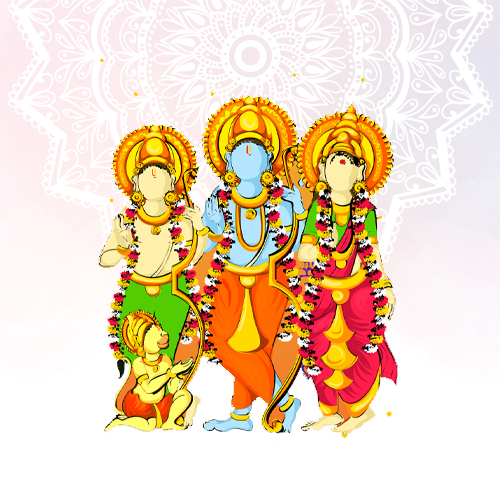
Ram Katha
Ram Katha is a devotional narration or storytelling event centered on the life and exploits of Lord Rama, the hero of the epic Ramayana. These events are deeply spiritual and culturally significant in Hindu tradition, often involving elaborate recitations, musical performances, and discourses that recount the divine tales of Lord Rama, his consort Sita, his loyal brother Lakshmana, and his devoted follower Hanuman. Ram Katha is a means to propagate the teachings and values embedded in the Ramayana, including dharma (righteousness), devotion, loyalty, and the victory of good over evil.
-
Purpose:
- Spiritual Upliftment: To inspire and uplift the spiritual lives of the audience.
- Moral Teachings: To impart moral and ethical values illustrated through the life of Lord Rama.
- Cultural Preservation: To preserve and promote the cultural and religious heritage of the Ramayana.
-
Structure:
- Introduction: The Katha usually begins with an introduction that sets the context for the stories to be told.
- Narration: The main body involves the narration of various episodes from the Ramayana, often focusing on specific themes or events.
- Musical Interludes: Hymns (bhajans), devotional songs (kirtans), and music are interspersed with the narration.
- Explanations and Discourses: The storyteller (Katha Vachak) provides explanations, interpretations, and moral lessons derived from the stories.
-
Benefits:
- Spiritual Growth: Enhances devotion and spiritual understanding.
- Community Building: Brings people together, fostering a sense of community and shared faith.
- Moral Guidance: Provides ethical guidance and inspires righteous living.
- Cultural Enrichment: Enriches cultural knowledge and appreciation of Hindu traditions.
-
Occasions:
- Festivals: Ram Katha is often organized during festivals like Ram Navami (the birthday of Lord Rama) and Diwali (celebrating Lord Rama's return to Ayodhya).
- Special Events: Can be part of other religious ceremonies, anniversaries, and community gatherings.
- Pilgrimages: Pilgrimage sites associated with the life of Lord Rama often host Ram Katha events.
-
Preparation:
- Select a Venue: Choose a suitable location such as a temple, community hall, or even a home.
- Invite a Storyteller: Arrange for a knowledgeable and respected Katha Vachak to lead the event.
- Gather Resources: Prepare the necessary texts, musical instruments, and other materials required for the Katha.
-
During the Katha:
- Participation: Engage actively by listening attentively, singing along with the hymns, and participating in discussions.
- Reflect on Teachings: Reflect on the moral and spiritual teachings shared during the Katha.
- Community Interaction: Interact with fellow participants to share insights and build a sense of community.
Ram Katha is a powerful medium for spiritual growth and moral enrichment, bringing the timeless teachings of the Ramayana to life through captivating storytelling and community engagement.
 Add Temple
Add Temple